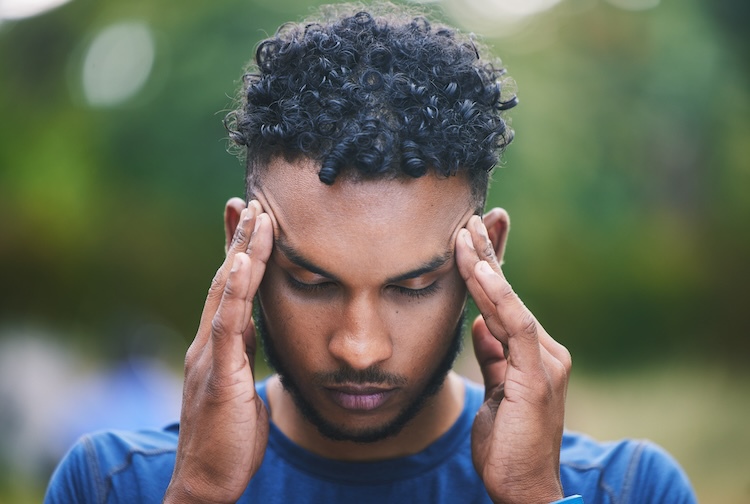
Concussion facts and myths
VCU Health team members highlight common misconceptions about concussions and what the recovery process looks like for patients.
January 23, 2024 Concussions are considered the most common form of traumatic brain injury diagnosed annually. (Getty Images)
Concussions are considered the most common form of traumatic brain injury diagnosed annually. (Getty Images)
By Sara McCloskey
Getting “dinged” or having your “head knocked” while playing a sport or moving heavy furniture might not sound like a serious injury. But VCU Health experts note how phrases like these often downplay concussions.
Concussions are considered mild traumatic brain injuries (mTBI), and according to the Centers for Disease Control and Prevention, they are the most common TBI diagnosed each year.
A concussion can happen when you bump your head or elsewhere on your body in a manner that causes the head and brain to move quickly back and forth. This sudden movement can make the brain bounce around in the skull and cause chemical changes or damage brain cells.
“Using inappropriate terms like ‘ding,’ ‘bell rung,’ and ‘head knock’ can stand in the way of people seeking care when they may need it,” said Samuel Walton, Ph.D., certified athletic trainer and assistant professor at Virginia Commonwealth University School of Medicine’s Department of Physical Medicine and Rehabilitation. “Not all concussions will result in problems for the injured person. However, it is important to seek care from a qualified healthcare provider so that they can examine the injured person and create a plan for treatment and recovery.”
Walton and his colleague, Olivier Rolin, M.D., Ph.D., an assistant professor in the School of Medicine’s Department of Physical Medicine and Rehabilitation and a provider at Children’s Hospital of Richmond at VCU, study concussions and ways to improve brain health. They share tips on how to spot concussions as well as common misconceptions about these injuries.
What symptoms can a concussion cause? How long can it take for concussion symptoms to show up?
Symptoms typically show up within minutes or up to a few hours after a concussion injury, but sometimes they may take until the next day or two. Symptoms can vary for each person. Some may experience changes in their sleep patterns – either sleeping more or less, increased fatigue, headaches, fogginess, balance problems and dizziness. Other patients can also have trouble concentrating, may be more irritable and/or anxious.Because these symptoms are similar to other health problems, it’s sometimes difficult for an individual, family member or provider to connect them to a concussion.
“One of the most common issues with receiving a concussion is difficulty in recognizing that an injury happened in the first place. Studies have shown that a frequent reason for not reporting a concussion injury to a healthcare provider is that the injured person didn’t realize there was a problem. This can happen if symptoms take a while to several hours or days to start or are relatively mild, like a small headache, because they might be explained by some other issue, such as feeling tired or sick,” Walton said.
What does recovery look like from a concussion?
The recovery process can take a few days to a few months, depending on the severity. Walton and Rolin recommend patients take it easy, rest and gradually increase activities over time. Some experts also recommend limiting screen time and loud music before bed, sleeping in a dark room and sticking to a consistent bedtime and wake-up schedule.Some patients can continue to experience symptoms for a month or longer. While it might be frustrating and confusing at times, Rolin says patients “need to be reassured that this can be normal and not to despair.”
“The challenge is how to manage external stresses that we can't always control like school, work, sports teams, family and friends. A concussion should not lead to depression or permanent cognitive impairment but failure to address the needs of an individual who is recovering can lead to chronic anxiety, depression, fatigue and brain fog,” Rolin said. “Eventually healthy practices will bring them back to their old selves, but it may take a frustratingly long time. For those who are on the long path to recovery, I always like to find objective signs of improvement to help them see that they are in fact on the way to recovery.”
Another aspect of recovery is managing trauma from the incident that caused the concussion. Concussions may be a result of violent traumas, such as car crashes, falls from great heights, fights and sports collisions, which Rolin says can cause someone to also experience post-traumatic stress syndrome (PTSD). The symptoms of PTSD often overlap with those of a concussion.
“PTSD must not be missed because it requires prompt and sometimes extensive psychological intervention. PTSD is most frequently missed in toddlers, whose emotional depth is often masked by how cute and silly they are,” Rolin said. “It is also overlooked in athletes in sports collisions because we look at athletes as rugged and fearless, but they can be just as soft on the inside as anyone else.”
What advice would you have for people who think they have a concussion?
If an individual suspects they might have a concussion, Walton and Rolin say they should get help from a qualified health care provider, such as an athletic trainer, doctor or nurse practitioner.“Even if someone is unsure whether they have a concussion, but they have been exposed to a possible cause, they should pay attention to any new symptoms that come up over the next few hours and following days,” Walton said. “While none of these symptoms are unique to a concussion, they may be the result of the brain injury or healing process and should be considered as indicators that an injury has occurred. If there’s a plausible cause of injury and symptoms that follow, a visit to a healthcare provider is indicated.”
Do concussions affect children and teenagers differently than adults?
While the idea that children “bounce back quicker from injury is certainly a myth,” Rolin says, concussions can create significant limitations that are different for children than adults.For example, children use more energy during activities at a park or pool compared to adults. If they don’t follow recommendations from a doctor, such as pulling back on activities and resting, children may feel more symptoms and take longer to recover.
“For young people who go to the other extreme and go into a state of bed rest, they may experience more anxiety, social isolation and restlessness,” Rolin said. “Trying to find the optimal balance so that young people recovering from a concussion remain reasonably engaged but avoid over stressing themselves is the key challenge in helping them recover. Getting parents, teachers, and coaches to understand this concept is crucial.”
What are some of the biggest misconceptions about concussions?
A notable misconception, brought up by Walton, is that people think they can “power through” if they have a concussion.When someone is recovering from a concussion, their brain is using more energy than usual for regular daily activities, such as moving their body and thinking. A patient's body may not be able to keep up if more pressure is put on the brain and body, which can extend recovery time, increase symptoms and risk another injury.
“Continuing to stress the brain while it’s trying to heal can be dangerous. Choosing to not seek care and continuing to “play through” a concussion are not signs of mental or physical toughness – in fact, these choices are likely to make things worse for the injured person,” Walton said. “If an athlete wants to avoid missing valuable playing time in their sport, they should know that they will miss less time overall by stopping right after their injury than if they try to play through it and don’t allow the brain to heal.”
And for coaches and family members, Walton says the general rule of thumb is, “when in doubt, sit them out.”
What else should people consider before returning to sports or physical activity after sustaining a concussion?
As mentioned before, VCU Health team members and researchers recommend, whenever possible, to get guidance from a healthcare provider when returning to a sport or physical activity after sustaining a concussion.The current clinical recommendations suggest patients should increase activity a little bit each day after concussion symptoms have gone away. Walton says it’s also important to keep track of how a patient’s symptoms change if they are increasing physical activity.
“If an exercise causes significant worsening of symptoms for someone during the activity or in the hours to follow, it may mean that the person is not yet ready to engage in those types of activities. The brain and body may require more rest or a slower progression of physical activity to help facilitate the healing process,” Walton said. “On the other hand, a person that does not experience worsening of symptoms during or after an exercise may be ready to continue progressing toward unrestricted activities.”



